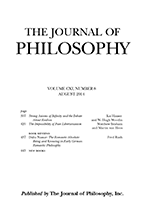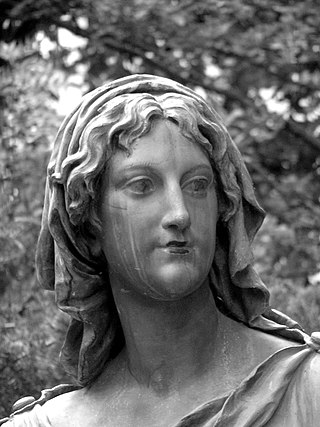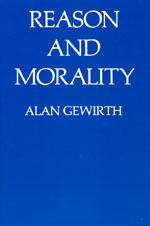Related Research Articles

The Latin cogito, ergo sum, usually translated into English as "I think, therefore I am", is the "first principle" of René Descartes's philosophy. He originally published it in French as je pense, donc je suis in his 1637 Discourse on the Method, so as to reach a wider audience than Latin would have allowed. It later appeared in Latin in his Principles of Philosophy, and a similar phrase also featured prominently in his Meditations on First Philosophy. The dictum is also sometimes referred to as the cogito. As Descartes explained in a margin note, "we cannot doubt of our existence while we doubt." In the posthumously published The Search for Truth by Natural Light, he expressed this insight as dubito, ergo sum, vel, quod idem est, cogito, ergo sum. Antoine Léonard Thomas, in a 1765 essay in honor of Descartes presented it as dubito, ergo cogito, ergo sum.

Jürgen Habermas is a German philosopher and social theorist in the tradition of critical theory and pragmatism. His work addresses communicative rationality and the public sphere.

Hans-Hermann Hoppe is a German-American academic associated with Austrian School economics, anarcho-capitalism, right-wing libertarianism, and opposition to democracy. He is professor emeritus of economics at the University of Nevada, Las Vegas (UNLV), senior fellow of the Mises Institute think tank, and the founder and president of the Property and Freedom Society.
Subjectivism is the doctrine that "our own mental activity is the only unquestionable fact of our experience", instead of shared or communal, and that there is no external or objective truth.
A consensus theory of truth is the process of taking statements to be true simply because people generally agree upon them.
Universal pragmatics (UP), more recently placed under the heading of formal pragmatics, is the philosophical study of the necessary conditions for reaching an understanding through communication. The philosopher Jürgen Habermas coined the term in his essay "What is Universal Pragmatics?" where he suggests that human competition, conflict, and strategic action are attempts to achieve understanding that have failed because of modal confusions. The implication is that coming to terms with how people understand or misunderstand one another could lead to a reduction of social conflict.
Alan Gewirth was an American philosopher, a professor of philosophy at the University of Chicago, and author of Reason and Morality (1978), Human Rights: Essays on Justification and Applications (1982), The Community of Rights (1996), Self-Fulfillment (1998), and numerous other writings in moral philosophy and political philosophy.

Karl-Otto Apel was a German philosopher and Professor Emeritus at the University of Frankfurt am Main. He specialized on the philosophy of language and was thus considered a communication theorist. He developed a distinctive philosophical approach which he coined transcendental pragmatics.
Discourse ethics refers to a type of argument that attempts to establish normative or ethical truths by examining the presuppositions of discourse. The ethical theory originated with German philosophers Jürgen Habermas and Karl-Otto Apel, and variations have been used by Frank Van Dun and Habermas' student Hans-Hermann Hoppe.

Communicative rationality or communicative reason is a theory or set of theories which describes human rationality as a necessary outcome of successful communication. This theory is in particular tied to the philosophy of German philosophers Karl-Otto Apel and Jürgen Habermas, and their program of universal pragmatics, along with its related theories such as those on discourse ethics and rational reconstruction. This view of reason is concerned with clarifying the norms and procedures by which agreement can be reached, and is therefore a view of reason as a form of public justification.

The Journal of Philosophy is a monthly peer-reviewed academic journal on philosophy, founded in 1904 at Columbia University. Its stated purpose is "To publish philosophical articles of current interest and encourage the interchange of ideas, especially the exploration of the borderline between philosophy and other disciplines." Subscriptions and online access are managed by the Philosophy Documentation Center.

The Theory of Communicative Action is a two-volume 1981 book by the philosopher Jürgen Habermas, in which the author continues his project of finding a way to ground "the social sciences in a theory of language", which had been set out in On the Logic of the Social Sciences (1967). The two volumes are Reason and the Rationalization of Society, in which Habermas establishes a concept of communicative rationality, and Lifeworld and System: A Critique of Functionalist Reason, in which Habermas creates the two level concept of society and lays out the critical theory for modernity.
An ideal speech situation was a term introduced in the early philosophy of Jürgen Habermas. It argues that an ideal speech situation is found when communication between individuals is governed by basic, implied rules. In an ideal speech situation, participants would be able to evaluate each other’s assertions solely on the basis of reason and evidence in an atmosphere completely free of any nonrational “coercive” influences, including both physical and psychological coercion. Furthermore, all participants would be motivated solely by the desire to obtain a rational consensus.
Articles in social and political philosophy include:

The paradox of tolerance is a philosophical concept suggesting that if a society extends tolerance to those who are intolerant, it risks enabling the eventual dominance of intolerance, thereby undermining the very principle of tolerance. This paradox was articulated by philosopher Karl Popper in The Open Society and Its Enemies (1945), where he argued that a truly tolerant society must retain the right to deny tolerance to those who promote intolerance. Popper posited that if intolerant ideologies are allowed unchecked expression, they could exploit open society values to erode or destroy tolerance itself through authoritarian or oppressive practices.
This is an index of Wikipedia articles in philosophy of language

Reason and Morality is a 1978 book about ethics by the philosopher Alan Gewirth. The work for which he is best known, it received positive reviews. The work is defended by the legal scholar Deryck Beyleveld in The Dialectical Necessity of Morality (1991).

The Search for Truth by Natural Light is an unfinished philosophical dialogue by René Descartes “set in the courtly culture of the ‘honnête homme’ and ‘curiosité’.” It was written in French but that was lost around 1700 and remained lost until a partial copy was discovered in G.W. Leibniz's papers in Hanover in 1908 and published in the Adam-Tannery edition of Descartes's works and correspondence. A Latin translation, Inquisitio Veritatis per Lumen Naturale, was published in 1683 as part of Renati Des-Cartes Musicae compendium and again in 1701 as part of R. Des-Cartes Opuscula posthuma, physica et mathematica ; it was also included in a Dutch translation of a collection of letters from Descartes published in 1684 by J.H. Glazemaker.
References
- 1 2 Haberman, Jürgen (1990). Moral Consciousness and Communicative Action. Cambridge: Massachusetts Institute of Technology. p. 80. ISBN 978-0-7456-11044.
- ↑ Apel, Karl-Otto (1975). "The problem of philosophical fundamental-grounding in light of a transcendental pragmatic of language". Man and World. 8 (3): 239–275. doi:10.1007/BF01255646. S2CID 144951196.
- ↑ Hintikka, Jaakko (1962). "Cogito, Ergo Sum: Inference or Performance?". The Philosophical Review. 71 (1): 3–32. doi:10.2307/2183678. JSTOR 2183678.
- ↑ Hoppe, Hans-Hermann (September 1988). "The Ultimate Justification of Private Property" (PDF). Liberty. 1: 20.